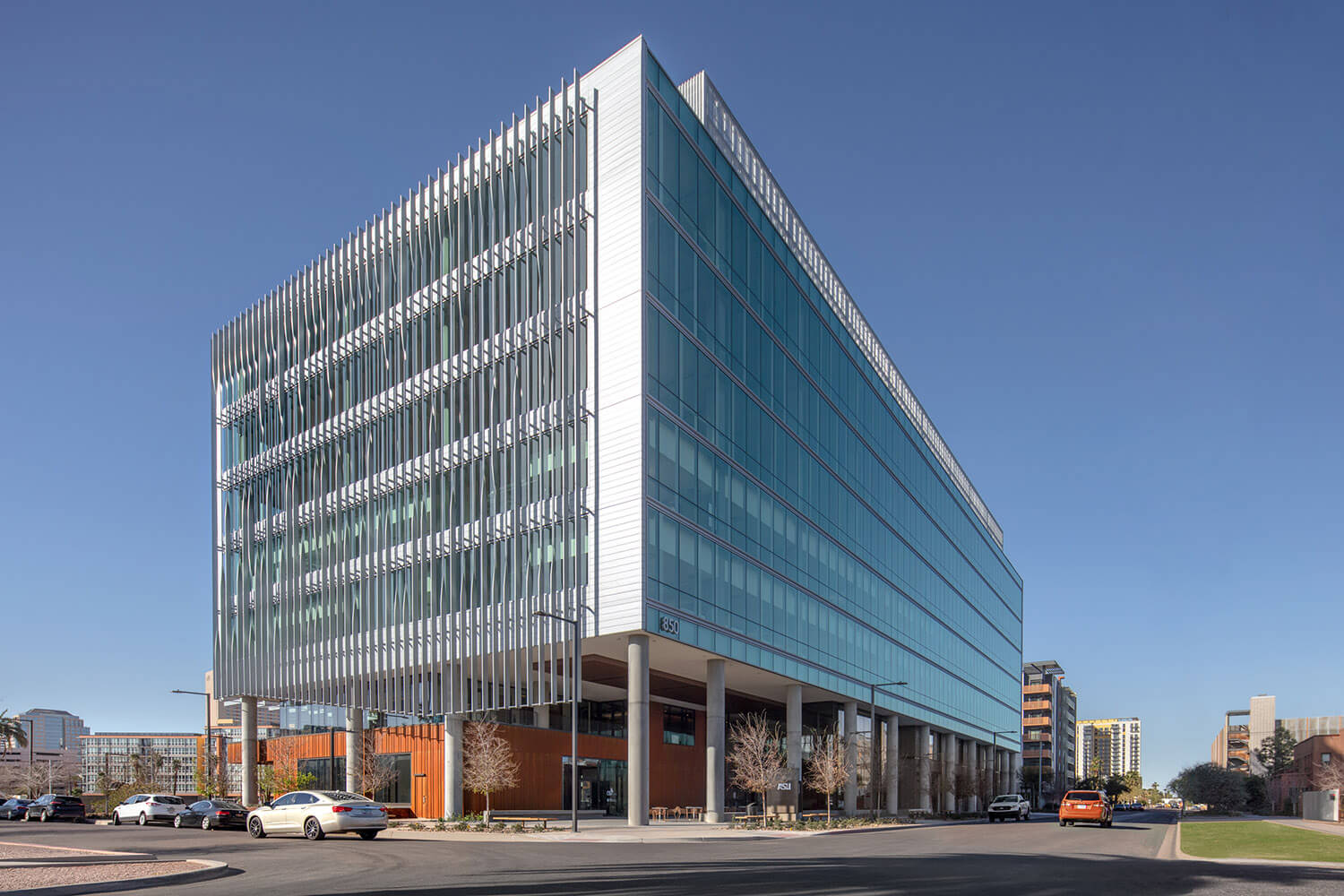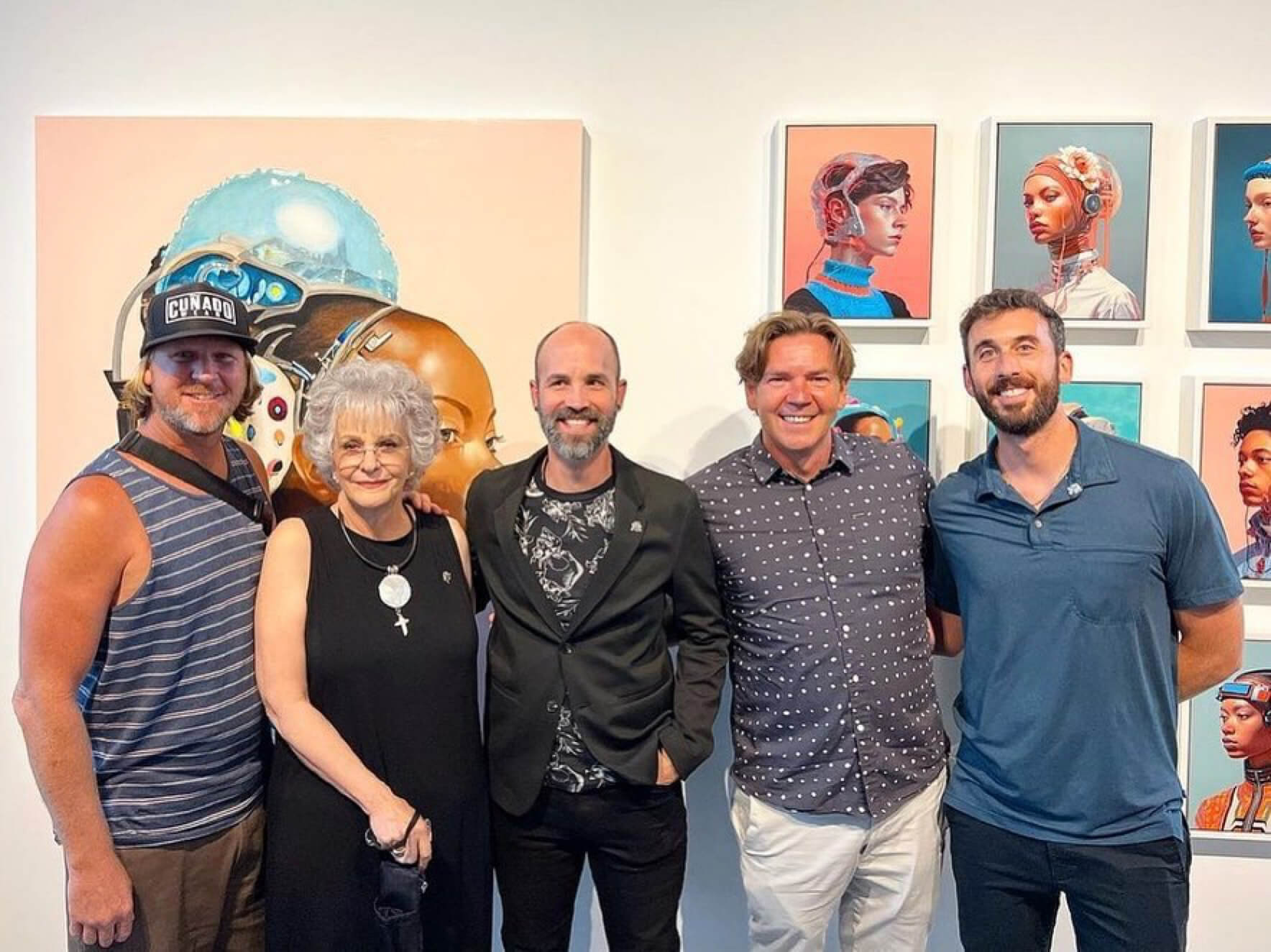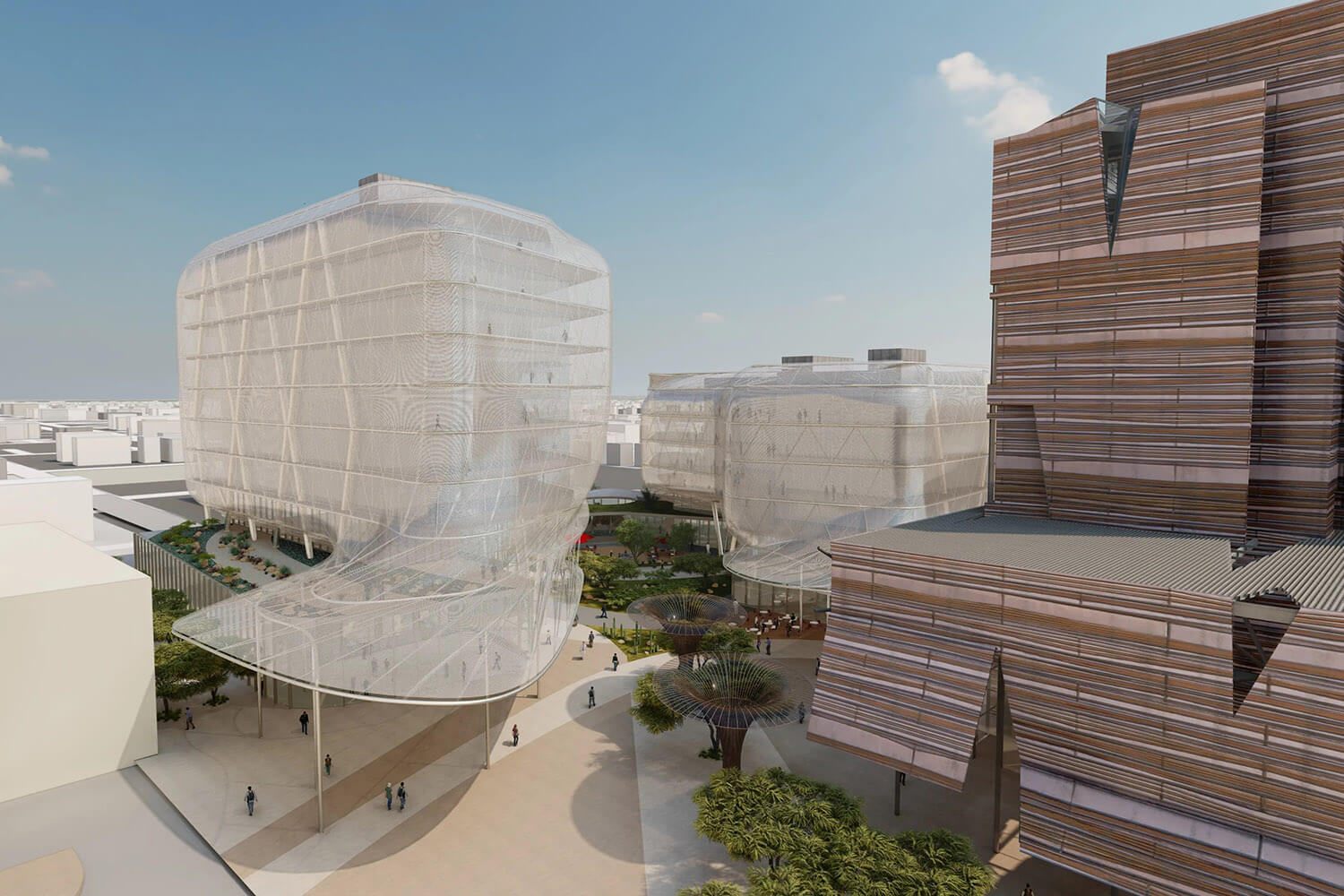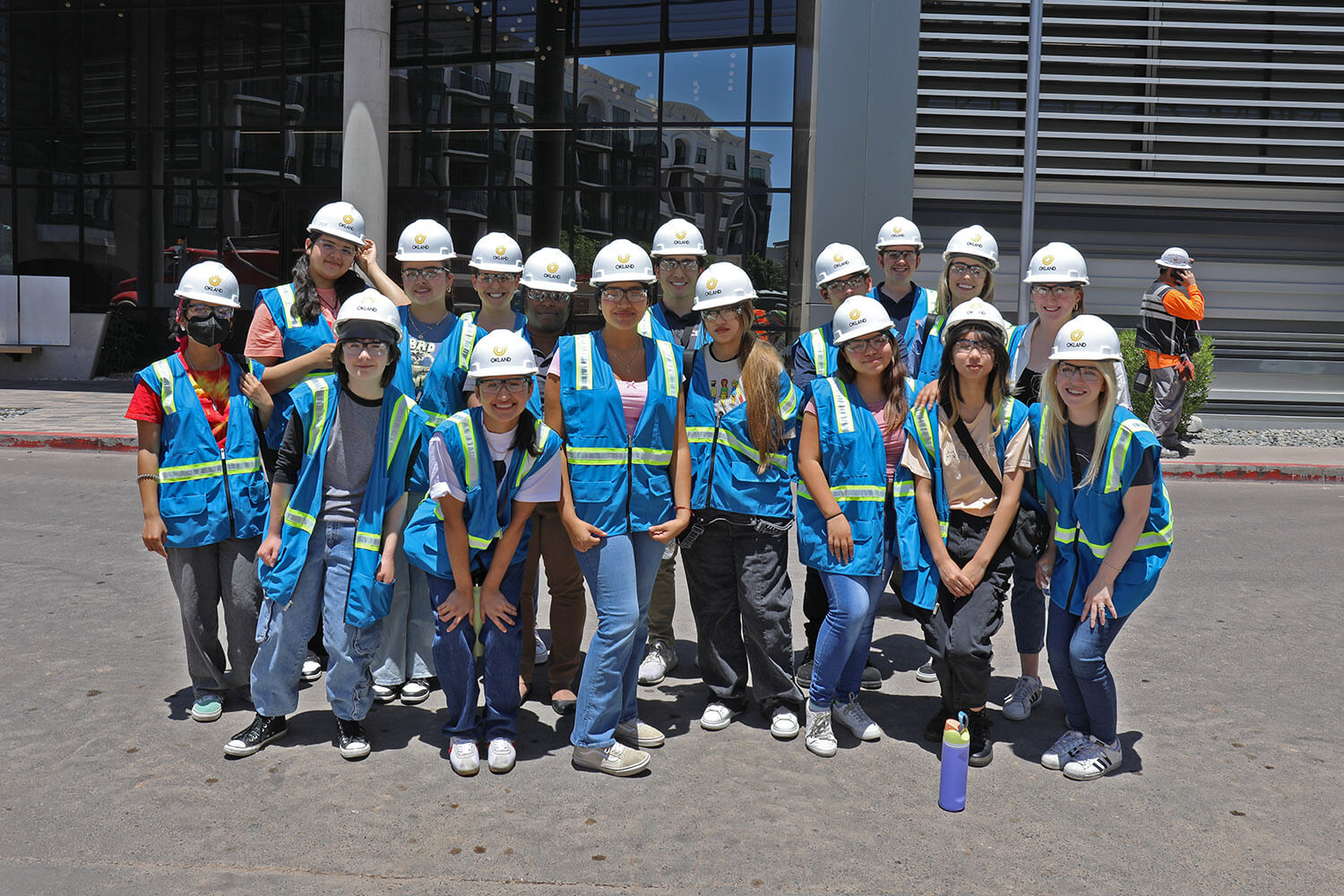What is now a thriving 30-acre life science and innovation hub on the east side of Downtown, the Phoenix Bioscience Core was initially assembled as land by Phoenix Community Alliance and the then-Downtown Phoenix Partnership for a potential site for Arizona Cardinals stadium in the early 2000s.
The Phoenix Bioscience Core is a collection of Arizona’s three major universities — Arizona State University (ASU), University of Arizona (UArizona), and Northern Arizona University (NAU) — three of the five major hospital systems, and a mixture of public and private research all clustered under the same umbrella of real estate between Roosevelt Row in the Evans Churchill neighborhood and Downtown.
More than 20 years later, a vibrant makeup of artisans, residents, professionals, students, and entrepreneurs occupy the same relatively compact area. The collection of these different groups often co-mingle to create and ultimately complement the work of the other.
For Bioscience Week (9/25 to 9/29), we present stories about our PCA Members contributing to this rich innovation of public-private partnerships.
National Institute of Health (NIH) Comes to Roosevelt Row

ASU and Wexford Science + Technology’s seven-floor 850 PBC opened in early 2021. (Photo by Bill Timmerman)
Exciting things have happened within ASU/Wexford Science + Technology’s seven-story 850 PBC building since its opening in 2021, and more is on the horizon!
In mid-September, it was announced that the National Institute of Health (NIH) signed a lease to occupy 850 PBC’s unoccupied seventh floor. A subset institute within NIH, the National Institute of Diabetes and Digestive and Kidney Diseases is relocating from its TGen location, where they’ve been based since 2005.
Known for pivotal innovations in diabetes research, epidemiological experts will benefit from the potential increased opportunities from the location.
Some current stakeholders operating within 850 PBC’s walls include ASU, their building partner, the Center for Entrepreneurial Innovation’s (CEI) LabForce, and multiple bioscience startups.
PCA Members Cushman & Wakefield brokered the real estate deal to transform the space into a reality, while fellow Members SmithGroup and Okland Construction handle the architecture and construction services.
Translational Research Transforms into Art

Bentley Calverly, Bentley Gallery’s owner, poses in front of the collaboration between artist James Angel, second from right, and researcher Chad Stetcher, far right, during the opening reception for Artist + Researcher’s Year 2 Grand Opening, pictured Saturday, August 19, 2023. Fellow artists Randy Slack, far left, and Craig Randich, Bentley Gallery’s Art Director, center, flank the Artist and Researcher team. (Courtesy of Bentley Gallery)
What happens when a researcher and artist collaborate to create art?
Last November, artists and research teams were paired via a “speed dating” event, in which both parties ranked their preferences. Ten artists shadowed researchers from ASU, NAU, University of Arizona College of Medicine – Phoenix, and TGen for nine months in the Artist + Researcher program (ARx2), now in its second year.
Artists worked alongside researchers to translate complicated research and theses into mixed-media art installations. Examples of the displayed work include “EC Corps,” adapted from an idea that decoding subtle facial movements to reveal someone’s intent, and “Now Go Be Normal,” a playable board game where players assume the role of children in the foster system, where card and gameplay decide if they will ”fall through the cracks.”
In mid-August, Bentley Gallery displayed the artistic result of these collaborations at an opening reception.
ARx3 applications are open from September 15 through October 15.
CAMI: The Next Stage of the PBC

The Center for Advanced Molecular and Immunological Therapies (CAMI) will be located north of the University of Arizona College of Medicine – Phoenix, between Fillmore and 7th Street. (Rendering courtesy of UArizona)
Thanks to an infusion of American Rescue Plan Act (ARPA) federal funding from Maricopa County’s Board of Supervisors, the University of Arizona’s Center for Advanced Molecular and Immunological Therapies (CAMI) will receive an additional $4M in funding for the creation of the new hub.
The innovative concept of CAMI is centered on developing preventative care and treating cancers and infectious diseases using the body’s immune system. Their research would also focus on treating COVID-19 and its lingering side effects and symptoms.
Bioscience Students Preview STEM Jobs And Careers

The Bioscience High School Summer Campers and staff from Center for Entrepreneurial Innovation (CEI), Downtown Phoenix, Inc., and Phoenix Community Alliance pose after a tour of The Global Ambassador, pictured June 6, 2023. (Photo by Okland Construction)
In June, Phoenix Bioscience High School students took a series of tours previewing different jobs so they could apply their STEM (science, technology, engineering, and mathematics) education to careers.
Center For Entrepreneurial Innovation (CEI) arranged the field trips for their second annual Bioscience Summer Camp.
The bioscience students observed and met professionals applying their skills in different venues, from workshops, construction sites, and medical facilities.
The students traveled throughout Downtown and across the Valley to explore the jobs of many CEI partners on the PBC. Trips to NAU and UArizona revealed the fundamentals of patient care by physicians, such as differentiating between regular heartbeats and murmurs, checking the pupils to assess head injuries, and treating cardiac arrest using a simulation.
The entire blog can be read here.
Flinn Foundation: The vibrancy of Arizona’s bioscience tech start-up culture continues
Every year for the last decade, the Flinn Foundation’s Bioscience Entrepreneurship Program awards grants toward bioscience startups to decrease the gaps in technology and patient care.
In early spring, the Flinn Foundation announced $30,000 grants to six companies, a list whittled down from 48 applicants throughout Arizona’s bioscience startup community.
Since the start of the year, these companies have received grants toward technological expediency, from researchers having inexpensive, easy access to cancer specimens to using a single platform to order genetic testing and transferring patient data.
In addition to grant funding, the foundation provides support, like mentorship and access to bioscience networks, for them to prosper.
A recent CBRE study found that the Phoenix is among the country’s fastest-growing life sciences markets; with all the concentrated collaboration and innovation happening in the PBC, it’s not difficult to see why.
Adjacent to the I-10 and Sky Harbor Airport, the Phoenix Bioscience Core presents a sweet spot for local researchers, investors, and visitors.
And the PBC isn’t done expanding. With more groundbreakings and infusions of resources on the horizon, the future of the core looks bright!





